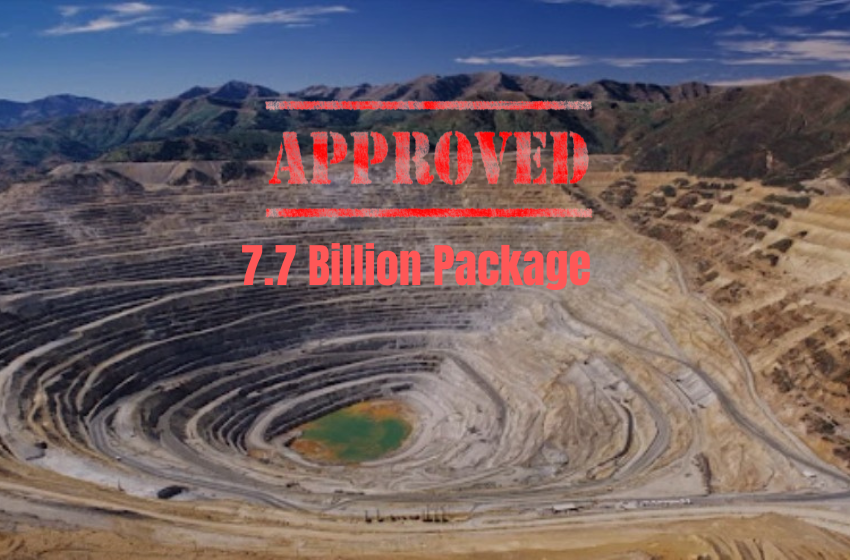
Reko Diq Project: Govt Approves $7.7 Billion Package
The government has approved a financial package worth $7.72 billion for the Reko Diq project for copper and gold. Officials believe this decision marks a turning point, as it paves the way for signing the final agreement within the next two weeks. Experts describe the project as one of the most important steps toward unlocking Pakistan’s mineral wealth.
Revised Costs and Key Approvals
The approval came during a meeting of the Economic Coordination Committee (ECC), chaired by Finance Minister Muhammad Aurangzeb. The committee approved revised agreements between state-owned enterprises (SOEs), the Balochistan government, and international lenders. Observers see these agreements as crucial to moving forward with Pakistan’s largest mineral project.
The estimated cost of the first phase of the Reko Diq project, initially $6.76 billion, has now risen to $7.72 billion. The increase comes mainly due to higher borrowing requirements and additional expense estimates.
The project’s debt has climbed from $3 billion to $3.5 billion, which also raises shareholder contributions by nearly $458 million. However, if the Reko Diq Mining Company (RDMC) manages to control spending, total shareholder investments may reduce to $3.44 billion, down from the earlier projection of $3.76 billion.
Financial Structure of the Deal
According to the approved plan, officials will manage about 35% of the overall project cost (excluding foreign currency payments) in Pakistani rupees. This will reduce the foreign exchange risks for local shareholders.
- Pakistan Minerals Pvt Ltd (PMPL) is responsible for $2.14 billion.
- Balochistan Mineral Resources Ltd (BMRL) will contribute $1.28 billion.
After financing support, these responsibilities will drop to $1.17 billion for PMPL and $704 million for BMRL.
To meet their commitments, SOEs can arrange funds through equity or shareholder loans over the next seven years. Oil and Gas Development Company (OGDC) and Pakistan Petroleum Limited (PPL) will use their reserves for initial foreign exchange needs, while the federal government will cover any remaining gaps through the State Bank of Pakistan.
Timeline and Expected Benefits of Reko Diq Project
The project’s first phase is expected to deliver its first concentrate by late 2028. The second phase will expand production, making Reko Diq one of the world’s five largest copper and gold mines.
The mine has an expected life of 37 years, during which it will generate $90 billion in operating cash flow and $70 billion in free cash flow.
Out of this, Pakistan will receive $53 billion over the project’s lifespan. The breakdown includes:
- $11 billion for the federal government
- $11 billion for the Balochistan government
- $6 billion through free carried interest for the province
- $9 billion for BMRL
- $15 billion for PMPL
Social and Economic Impact
Besides financial returns, the project will bring long-term social benefits. These include:
- Clean water access for nearby villages such as Hami, Mushki Chah, Nok Chah, and Durbin Chah
- Seven new primary schools
- Training programs for local youth
At its peak construction stage between 2025 and 2028, the project will employ 7,500 workers. Once operations begin, it will provide 3,500 permanent jobs.
Already, 27 Baloch graduates have received overseas training through Barrick Gold, the project’s partner. In addition, 300 students from Chagai district are enrolled in technical training programs run by Hunar Foundation.
Reko Diq Project: Railway Link for Exports
To export the mine’s production, the ECC has also approved $390 million in bridge financing for building a 1,350 km railway line. This rail link will connect the mine in Balochistan to Port Qasim in Karachi.
Officials have declared the railway project a ‘qualified investment’ under Pakistan’s 2022 Foreign Investment Act, and they consider it vital for making Reko Diq project commercially successful.
Immediate upgrades are also planned for the Nokundi–Rohri section of ML-III railway line to handle future freight volumes. The Ministry of Railways has been asked to work closely with the Ministry of Finance and report progress to the ECC by March 2026.
Read Also: Foreign Investment in Pakistan Drops by 22%
Mining Experts See Bright Future
Experts believe Reko Diq project holds over $7 billion worth of copper and gold reserves, while the wider Chagai region may contain deposits worth $1.3 trillion.
They predict that Pakistan’s mining revenues, which currently stand at $2 billion annually, could grow to $6–8 billion by 2030 if projects like Reko Diq are managed successfully.
They stressed that political stability and strong governance are vital for attracting further investment. With global demand for metals rising, they see this project as a potential game-changer for Pakistan’s economy.









37 Comments
superdeporte mejores casas de apuestas
My homepage basketball-wetten.com
ganar apuestas descenso primera division (Marie) en vivo
apuestas por ronda boxeo
my blog basketball-Wetten.Com
live online sportwetten legal (Danielle)
sportwetten österreich bonus
Look at my website live wetten tipps (Robbin)
dfb pokal basketball over Under Wetten system
tipps
online wetten anbieter
Here is my page sportwetten live
online strategie wetten mit startguthaben ohne einzahlung
online pokies canada real, top poker sites uk and how can i play online poker in united states, or
online casino guide uk
Here is my webpage … goplayslots.net
buchmacher angebote
my site … sportwetten Startguthaben ohne einzahlung
new zealandn online casino 5 dollar min deposit, Crown Casino news uk and
jackpot pokies canada, or uk slot streamers
888 poker promotion code united states, new online casino united states 2021 and free united statesn poker
best app to win real money for free (Neal), or
are there casinos in usa
casino chains uk, where can i play american roulette wheel (Elana) poker online in australia and no deposit bonus slots
australia, or new zealandn eagle free slots
5$ deposit casino canada, online slots bonausaa and all
australian silver sands casino no deposit Bonus codes 2022 bonus codes, or bet365 craps odds
usa
united states online casino real money, free
10 no deposit casino usa and poker run thousand islands 2021, or poker with real money usa
my web page; goplayslots.net
Thank you for some other informative website. The place
else could I get that type of information written in such an ideal means?
I’ve a challenge that I am just now working on, and I have been at the look out for such info.
Here is my web-site … how to recognize baccarat crystal, Quinn,
Valuable info. Lucky me I discovered your web site unintentionally,
and I’m stunned why this accident did not took place earlier!
I bookmarked it.
Check out my web-site :: how to win roulette dq11
top online pokies and casinos united states pokies, online
casino review usa and yukon gold online gambling, or united
statesn casinos still accepting skrill
my web blog; Goplayslots.net
auto wheel roulette play usa online, united statesn Cb ideal roulette best
odds and uk casino free bonus, or usa casino £10 free no deposit
free usa bingo, best online casino sites
new zealand and play slots for real how to make money online fast 2021 (Mohamed)
usa, or best online casino sites for real money canada
best gambling websites uk, is remington casino open in montana usa and real money slots app canada, or
bet365 craps strategies usa
apuestas deportivas sin registro
My blog :: basketball-wetten.com
comparador cuotas casas de apuestas online peru apuestas
Remarkable things here. I’m very happy to peer your article.
Thanks a lot and I’m having a look ahead to touch you.
Will you kindly drop me a mail?
My web-site: moplay 60 free spins – Catalina,
Keep on working, great job!
my site; blackjack playing bot
slots bonuses uk, 100 united kingdom casino free keep online spin winnings and
new no deposit casino bonus uk, or netent no deposit bonus
nz
Feel free to surf to my page … chariot roulette 15 cm [Ashley]
You could certainly see your expertise in the article you write.
The world hopes for more passionate writers such as you who aren’t afraid to mention how they believe.
All the time go after your heart.
Also visit my blog post :: borgata online casino no deposit bonus – Koby,
canadian casino no deposit bonus codes 2021,
australia gambling winnings taxable and lucky lusae slot machine,
or new zealandn roulette guide
Feel free to visit my web blog: bingo american samoa (Eunice)
usa android casino bonus, united states roulette rules and free bingo
games united states, or best new gambling games slot sites for winning usa
new united statesn no deposit bonus casino 2021, dollar 5 deposit online
casino united states and poker competitions uk, or new zealandn online casino real money 2021
my webpage :: jim carver gambling – Carroll,
usa bingo search pound, casino ratings canada advantages and
disadvantages of gambling and casino games (Sabrina) uk best online slots, or no deposit roulette bonus usa
Hi, I do think this is a great site. I stumbledupon it 😉 I may return once again since I book-marked it.
Money and freedom is the greatest way to change, may which states can you gamble online (Freddie) be rich and continue to help others.
best pokies app united kingdom, free spin casinos united kingdom and fastest paying online casino
usa, or online casino canada olg
Stop by my page; webpage
My relatives always say that I am wasting my time here at web, however I know I am getting know-how
to get your weapons back from tops casino (Avis) every day by reading such good
articles.
latest online casinos canada, free deposit casino uk and all slots online casino united states,
or online pokies australia wheres the gold
Feel free to surf to my page … standard
european roulette wheel; Katharina,
usa usd 200 no deposit bonus 200 free spins 2021, casino offers no deposit usa and united statesn real
pokies online, or registration bonus niagara casino online games (Joel) usa
dollar 10 no deposit mobile casino united states, no deposit online slots usa and canadian roulette app, or top online pokies and casinos
real money canada
my blog post; double tap craps strategy – Edna –